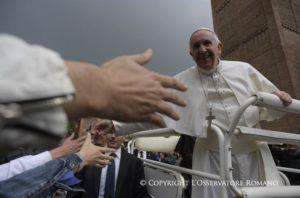|
Opinion: putting the Papal refusal to apologize in context and where the Roman Catholic Church stands today
By Kathleen Imbert
Bishops of Canada advised Pope Francis to not apologize to First Nations. Their letter addressed to “Indigenous Brothers and Sisters” said, “The Catholic Bishops of Canada have been in dialogue with the Pope and the Holy See concerning the legacy of suffering you have experienced. The Holy Father is aware of the findings of the Truth and Reconciliation Commission, which he takes seriously. As far as Call to Action #58 is concerned, after carefully considering the request and extensive dialogue with the Bishops of Canada, he felt that he could not personally respond”. (Letter from Bishop Legendre, March 28, 2018.) Popes, on the one hand, and in the past, have apologized for the ‘evils’ of the priests that make up the Catholic Church, the latest being in 2014 by Pope Francis. “Before God and his people I express my sorrow for the sins and grave crimes of clerical sexual abuse committed against you,” the Pope said. “And I humbly ask forgiveness. I beg your forgiveness, too for the sins of omissions on the part of Church leaders who did not respond adequately to reports of abuse made by family members, as well as by abuse victims themselves.” In 2013, Francis formed a Pontifical Commission for the Protection of Minors, made up of clergy and laity, which included two sexual abuse survivors of the clergy. One of them, Peter Saunders from England, was asked to take leave after criticizing the Pope on how he publicly gave support to the highly placed clergy. Marie Collins, an Irish survivor, resigned and in a letter to Cardinal Muller, who presides the Doctrine of Faith (a key Vatican department and keeper of good Catholic practices), gives an account of her experience in the commission and her insights on its inertia on the case of sexual abuse. “It appears that for you, the concern that the local bishop might feel disrespected far outweighs any concern about disrespecting the survivor.” Then there was Pope Benedict XVI who apologized in a dramatic apology to the victims of decades of sex abuse by Catholic priests in Ireland, expressing his “shame and remorse” for the “sinful and criminal acts” in 2010. His apology was criticized for only mentioning victims in Ireland and not the bishops who have been trying to guard the Catholic Church’s reputation, avoiding scandals, and covering up for pedophile clergy. Bishops; however, have consistently kept the lid on pedophile priests by sending them from one diocese to another in attempt to avoid public scandals once the problem surfaced. Out of these papal contritions, not much has emerged in terms of repairing the image of the Catholic Church nor of changing the continual cover-up of clergy and notably its bishops. In 1962, a highly secret Vatican document, Crimen sollicitationis, which in English translates into crime of solicitation, addressed to all Patriarchs, Archbishops, Bishops and other local ordinaries, also of the Oriental rite, were “bound by the Secret of the Holy Office, the highest form of confidentiality employed by the Holy See. (Violation of the secret resulted in automatic excommunication, the lifting of which was especially reserved to the Holy Father.)”. Crimen sollicitationis was supposed to be kept secret and not for public consumption, (as it states at the beginning of the document: TO BE KEPT CAREFULLY IN THE SECRET ARCHIVE OF THE CURIA FOR INTERNAL USE); however, came to light during the sexual abuse investigations of over a thousand children by priests in the Boston Archdiocese scandal from U.S. Air Force Maj. Thomas Doyle, a Catholic chaplain and expert on the Catholic canon. In France, sexual abuse survivors, organized in an association, are now taking the Catholic Church to courts. A French cardinal and another high-ranking Vatican official have been accused of covering up for a known sexual abuse perpetrator in the city of Lyon. The court case has been pushed to January 2019. After his visit to Chile and his ‘faux pas’ in excusing his friend, Bishop Juan Barros, and saying that the accusations against him were slander and ignoring victim’s statements, Pope Francis has called Chilean Bishops to Rome for a meeting. Francis admits in a tweet he has made “serious mistakes” and in a letter says, “I have made serious mistakes in the assessment and my perception of the situation, especially due to a lack of truthful and balanced information…”. Tangled up in legal battles today with their insurers in Canada that will cost them millions of dollars forcing them to sell assets to pay back their insurance companies and legal expenses for not disclosing information about clerical sexual abusers, the Roman Catholic Church is trying to not rock the boat. In the Canadian bishops’ minds, any acknowledgment on the behalf of the Pope with an official apology in response to an internationally renowned Truth and Reconciliation Report would give reason to the courts against the church for what seems to be a systemic institutional problem. Once the church has come to terms and act upon sexual abuse matters in a ‘sane’ manner, it may be able to apologize to First Nations in Canada. However, where it stands today on the matter, apologizing is like letting all hell break loose.
|
.
Any original material on these pages is copyright © BishopAccountability.org 2004. Reproduce freely with attribution.
